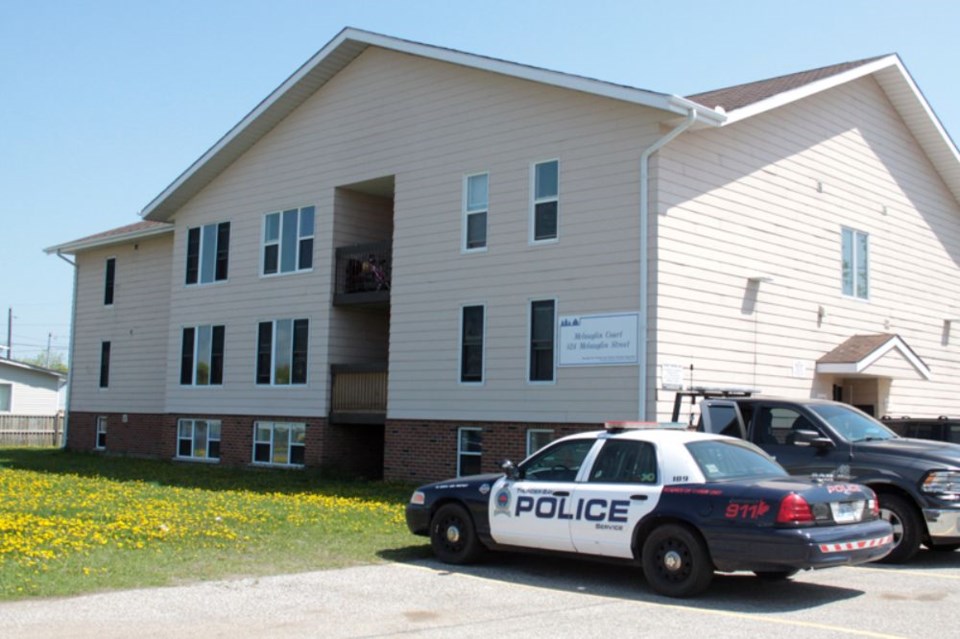THUNDER BAY -- A jury did not agree with David Wilson’s defence of not being criminally responsible for the fatal stabbing of 48-year-old Robert Barbeau, and instead found him guilty of second-degree murder
The jury was tasked with determining whether Wilson, a diagnosed schizophrenic, was criminally responsible for his actions. They reached their conclusions Wednesday after six hours of deliberations.
The conviction carries an automatic life sentence with parole eligibility beginning after a minimum of 10 years or maximum of 25. The length of time before parole eligibility will be decided at a future sentencing hearing.
Wilson briefly addressed the jury and Barbeau's family shortly after the verdict was rendered.
"What I have done is extremely violent," he said. "I can't express how sorry I am for what I have done."
He also described his actions as "unalterable" and said he would have to live with it for the rest of his life.
There was no dispute from the defence that on the evening of June 5, 2014, Wilson attacked Barbeau with a hunting knife in the parking lot of their McLaughlin Street apartment building, leaving the weapon lodged in the victim’s temple.
Instead, defence lawyer Neil McCartney argued Wilson was not criminally responsible for his actions as a result of his mental illness, which rendered him incapable to apply the knowledge that stabbing Barbeau was morally wrong.
During the trial, Crown prosecutor Rob Kozak presented evidence from forensic psychiatrist Dr. Mark Pearce, who assessed Wilson about eight months after the offence.
Pearce concluded that though Wilson does suffer from paranoid schizophrenia, he was only moderately ill at the time of the killing and should be held criminally responsible.
The psychiatrist said the attack was driven by anger and rage with a refusal to obtain painkillers from the victim as "the straw that broke the camel's back," as well as a dislike for the victim which was a result of past grievances and a long, conflicted relationship.
“Because (the jury) came back with a conviction for second-degree murder I expect they accepted the motive that Dr. Pearce had talked about,” Kozak said. “While there was a mental illness in existence, the motive for the killing was not based on that mental illness.”
Pearce identified several “red flags” where Wilson’s actions or remarks led him to believe the accused was either embellishing or misrepresenting his symptoms. The most significant of those was a comment about “going for the insanity plea” made to a police officer on the day of his arrest while in a holding cell.
The defence presented evidence from another forensic psychiatrist, Dr. Robert Sheppard, who examined Wilson in the immediate months following the stabbing.
Sheppard concluded Wilson was not criminally responsible and that his actions were fueled by delusions and there was no reality-based motive for the attack on Barbeau.
In his report, Sheppard said there were indications Wilson’s illness was getting progressively worse in the six months leading up to the killing. Just 11 days prior, Wilson attacked his nephew with a guitar and box cutter and just two days before the stabbing he expressed homicidal urges to a neighbour, stating he wanted to kill her.
McCartney described the verdict as a “disappointing result” considering those factors.
“Principally, the evidence about the days leading up to the stabbing I thought was most compelling. Dr. Sheppard’s opinion that Mr. Wilson was not responsible for the crime I also found compelling,” he said.
From the outset of the trial, McCartney said the desired outcome was for Wilson to received continuing treatment in a hospital, potentially for the rest of his life, rather than serve a penitentiary sentence.
“There was no doubt in this case, in anybody’s mind, including the psychiatrist who testified for the Crown, that the man was seriously mentally ill,” he said.
“Somebody who is seriously mentally ill is best dealt with in a psychiatric facility. Mr. Wilson won’t be there, he’ll be in prison so it’s not going to be the ideal setting for him, to put it mildly.”
Sign in or register
- Messages
- Post a Listing
- Your Listings
- Your Profile
- Your Subscriptions
- Your Likes
- Your Business
- Support Local News
- Payment History
Registered Users
Already have an account?
New Users
Create a free account.
